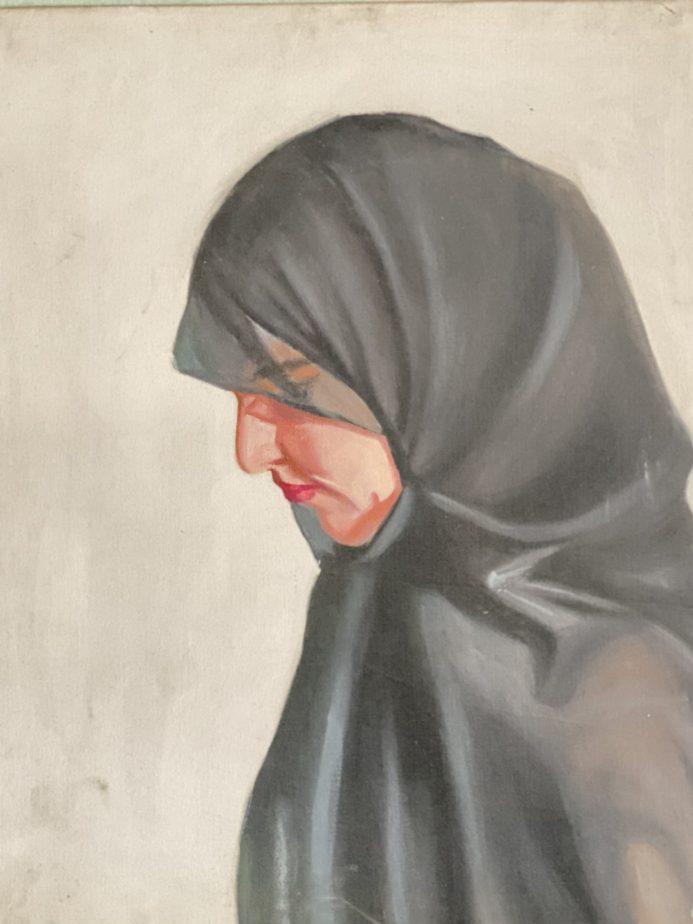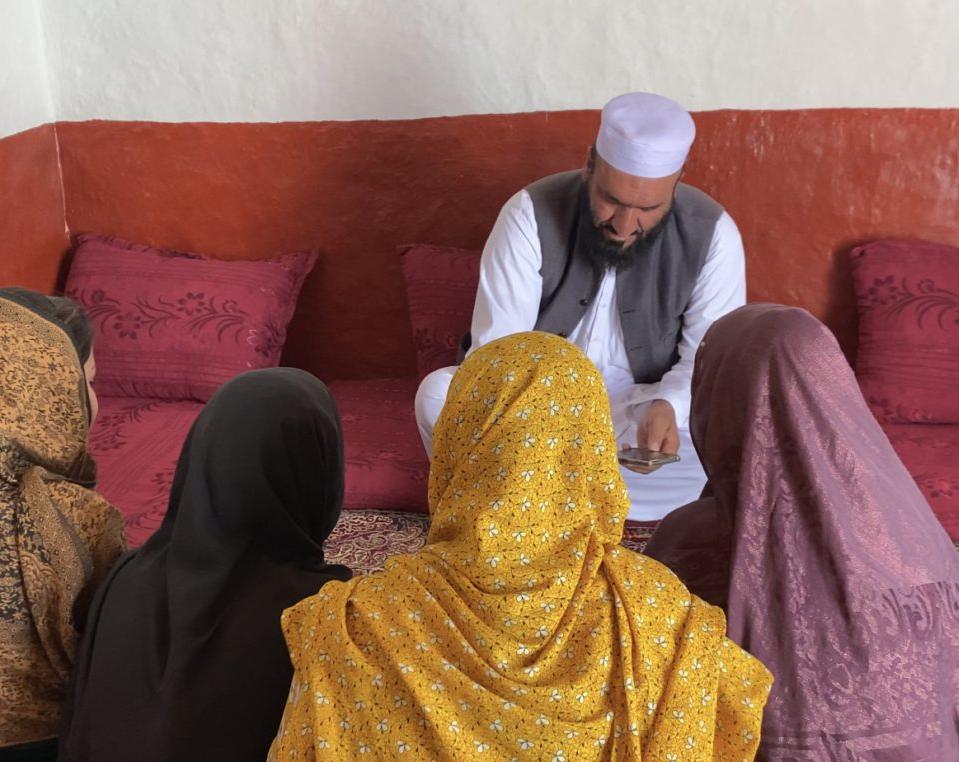The Pakistan government is pushing forward with its plans to arbitrarily and forcibly expel Afghan nationals, including refugees and asylum seekers, as part of the opaque ‘Illegal Foreigners Repatriation Plan’ which adds to the plight of at-risk Afghans. Between September 2023 and February 2025, at least 844,499 Afghan nationals have been forced to return back to Afghanistan where they are at real risk of human rights violations by the Taliban amid worsening humanitarian crisis.
These stories are part of a compendium titled published to mark Amnesty International’s new campaign #undothedeadline which aims to amplify the voices of Afghans at risk of unlawful deportation. The compendium spotlights ten stories of Afghan refugees and asylum seekers, artists, journalists and women who cannot go back to Taliban-ruled Afghanistan who are not only at-risk but also stand to lose decades worth of lives built in Pakistan.

Parwana Rahimi: An Afghan woman’s survival in exile
“Women who discuss national development and progress become a danger to those opposed to change,” says Parwana Rahimi*, a 27-year-old journalist from Laghman, Afghanistan, who has been working as a journalist since 2014, including at prominent Afghan media outlets. Much of her work aimed to raise awareness about the socio-economic challenges faced by Afghan women. Her passion for speaking about women’s rights in Afghanistan put her in the Taliban’s crosshairs. She started getting death threats and as the Taliban imposed several restrictions on women journalists, Parwana decided to leave Afghanistan for her survival and moved to Pakistan.
“When a woman moves to another country alone, she faces many problems,” she said. Even with her visa and legal documentation, the recent deportation orders have left many Afghan refugees, including Parwana, in a state of panic. “The officials spoke to me in an inappropriate manner and threatened to deport me back to Afghanistan.”
As someone who volunteers to assist fellow Afghan refugees with their cases handled by the UN Refugee Agency (UNHCR), Parwana has seen the toll of this fear on her community. “Many of these people were journalists, activists, and others who, if they returned, would face conflict with the government. They could be beaten, imprisoned, or even killed,” she said. The barriers to obtaining identification cards from UNHCR exacerbates the problem, as refugees are unable to prove their status to avoid arrest. This uncertainty weighs heavily on Parwana, who, despite her own fears, continues to offer hope and support to others in the refugee community. However, the psychological toll is undeniable.
Parwana’s message to the Pakistan government and the international community is clear: “Show us humanity. I request the Pakistan government to see us as human beings, not just refugees, and to extend their support to Afghan refugees facing genuine difficulties.”

Sahar: A transgender woman’s struggle for safety
Sahar*, a 20-year-old transgender woman, used to work as a secretary for a local hospital in Afghanistan. Societal pressures and discrimination forced her to suppress the expression of her gender identity. “I was unable to express my feelings to my society and family,” she recalled. “Women don’t have their rights, including education, job opportunities, and other basic human rights,” Sahar explained. “For transgender individuals, it’s even more difficult under the Taliban’s rule, which does not recognize such rights.”
With this realization and the increasing hostility around her, Sahar and her family made the painful decision to leave Afghanistan in search of safety. Sahar came to Pakistan with complete legal documentation and registered herself and her family with the UNHCR, as they awaited opportunities for resettlement in a third country. However, due to the volume of cases, she’s been told to wait for an indefinite time.
In April 2024, when the Pakistan government announced its intention to restart a fresh wave of deportations, Sahar and a group of others filed a petition in Peshawar High Court urging the authorities against forcefully repatriating refugees and asylum seekers from Khyber Pakhtunkhwa to Afghanistan. After granting a stay order in June 2024, the court directed the Pakistani authorities in January 2025 to determine asylum cases of artists and transgender individuals as per the principle of non-refoulement under international law. It also directed that no asylum seekers be deported until a decision is taken in individual cases by the government.
The fear of deportation is more than just a fear of relocation; for Sahar it could be a risk to life. “If we are deported, we face the risk of death because the Taliban does not recognize transgender rights.”
Sahar describes how displacement has left her feelings of insecurity and vulnerability unresolved even in Pakistan. “A transgender person is unsafe at any place without a home.”
Sahar appeals the international community to expedite their relocation to a safer country through UNHCR and pleas the Pakistani authorities to be allowed to wait in the country until their immigration to third countries are processed.
“I request that the Pakistan government sees us as human beings – not migrants, not as male, female or transgender.”

Two Stories, Same Fate: Malik Javed and Faisal Barakzai’s fight to secure their daughters’ future
For over four decades, Malik Javed* and Faisal Barakzai* have called Pakistan home. Both men have built their lives and families here. Yet, despite years of contributing to Pakistan’s economy and society, the looming threat of deportation haunts them. For them, the uncertainty of their own futures is overshadowed by an even greater fear: that their daughters’ education and futures will be stolen from them if they are forced to return to Afghanistan, where girls’ education is banned.
Malik Javed, who migrated to Pakistan in 1984, has lived in the country for 41 years. He has raised his children here, including two daughters, aged nine and seven, who are deeply invested in their schooling. The prospect of leaving Pakistan, where they have been born and raised, is devastating. For Javed, the threat of deportation means more than just losing his home – it means robbing his daughters of the opportunity to learn and grow. “When the rumors of deportation spread, my daughters were heartbroken, crying at the thought of losing their education,” he said.
Faisal Barakzai was born in Kohat after his family migrated from Afghanistan in 1978, has lived in the country for 47 years. He faces similar fears. “If we are deported, my daughters’ education will be disrupted,” he said. “Girls’ education is banned in Afghanistan, and I worry about what kind of future they will have if we are forced to leave.”
For Malik Javed and Faisal Barakzai, forceful returns to Afghanistan threatens not only their families’ safety and stability but also their livelihoods. “There are Afghans working in different parts of Pakistan, and their businesses are worth crores [tens of millions of Rupees],” Javed explained. “We pay taxes here, we contribute to the economy, yet we live in fear of being forced to leave with nothing.” Many in their community face unresolved financial obligations, with creditors refusing to repay loans to Afghans as the threat of deportation intensifies.
Both men share a common hope for Pakistan to treat them with compassion.
Javed, who is married to a Pakistani, has experienced the complexities of legal status that refugees and asylum seekers in Pakistan face; half the family members hold refugee cards, while the other half have Pakistani citizenship. Deportation could cause families to be torn apart. “We’ve spent generations here,” Javed said. “Our children and grandchildren were born here. Afghans are not a burden on Pakistan – we work hard and contribute to the economy.”
Faisal Barakzai echoed the same. “We just want to live dignified lives, contribute to society, and secure our daughters’ education.”
* Names changed to protect identity

